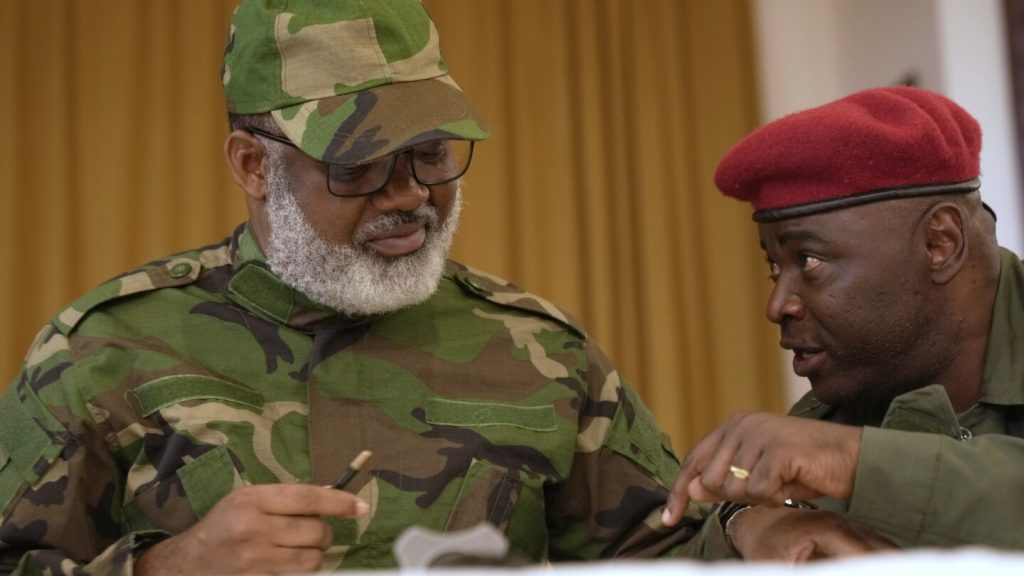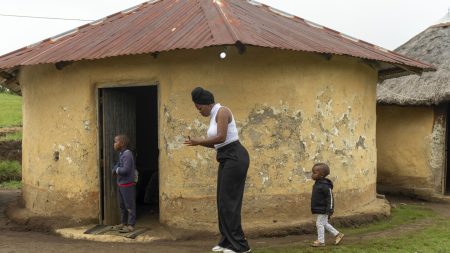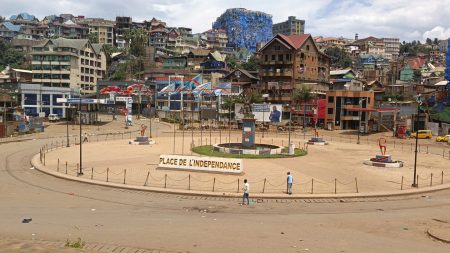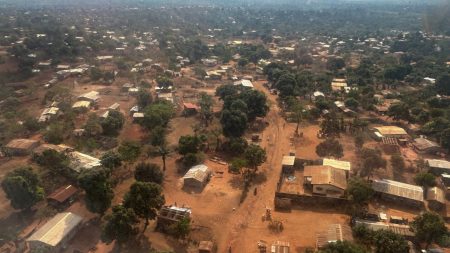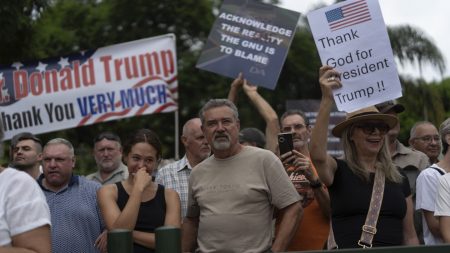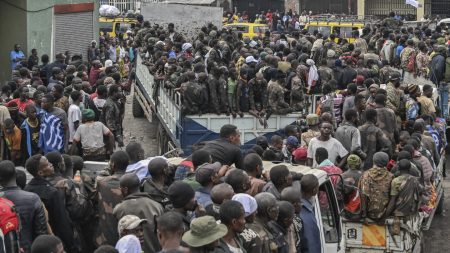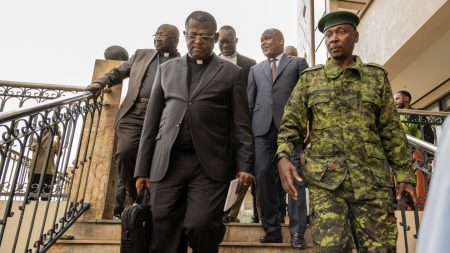The Rise of a New Rebel Leader: Corneille Nangaa and the Evolution of M23 in Eastern Congo
1. The New Face of Rebellion: Corneille Nangaa and M23’s Nationalist Agenda
In a dramatic shift in the dynamics of the conflict in eastern Congo, the M23 rebel group, long associated with ethnic Tutsi leadership, has unveiled a new face: Corneille Nangaa, a non-Tutsi figure with a controversial past in Congolese politics. This week, after M23 rebels, backed by Rwanda, seized control of Goma, the largest city in eastern Democratic Republic of Congo, Nangaa emerged as the group’s political leader. Unlike Sultani Makenga, the long-time ethnic Tutsi military leader who was conspicuously absent during the takeover, Nangaa presents a more diverse and Congolese nationalist image. Clad in military fatigues, Nangaa addressed reporters at Goma’s Serena Hotel, outlining his ambitious plan to "liberate" Congo by marching all the way to the national capital, Kinshasa, over 1,000 miles away. This shift in leadership and messaging reflects M23’s strategic rebranding from an ethnic Tutsi-dominated outfit to a broader Congolese nationalist movement, despite its well-documented ties to neighboring Rwanda.
2. From Election Chief to Rebel Leader: The Rise of Corneille Nangaa
Corneille Nangaa, once a key figure in Congolese politics, oversaw the contentious 2018 presidential election as the head of the country’s electoral commission. The election, which brought President Félix Tshisekedi to power, was marred by allegations of irregularities and sparked widespread criticism. Nangaa’s role in the process led to his being sanctioned by the U.S. in 2019 for undermining democracy in Congo. A falling-out with the Congolese authorities, reportedly over a mining concession dispute, forced Nangaa into exile in Kenya. In 2023, he joined the Congo River Alliance, a political-military coalition of 17 opposition parties and rebel groups united in their opposition to Tshisekedi’s government. His decision to join the alliance and later align with M23 was driven, analysts say, by a sense of betrayal and personal grievance. Political scientist Christian Moleka notes that Nangaa’s perceived mistreatment by the Congolese authorities, including Tshisekedi’s alleged refusal to advocate for the removal of U.S. sanctions against him, contributed to his radicalization.
3. An Alliance of Convenience: M23 and the Congo River Alliance
The union between M23 and the Congo River Alliance, with Nangaa at the helm, has transformed the rebel group into a more formidable force. Analysts describe the alliance as a "political umbrella" that allows M23 to expand its influence beyond its traditional ethnic Tutsi base. The partnership has enabled M23 to attract resources and allies from across eastern Congo, positioning it as a threat not only to the Tshisekedi government but also to the region’s stability. Angelo Izama, an analyst with the Uganda-based Fanaka Kwawote think tank, observes that M23 is now trying to "decouple the question of self-determination in eastern Congo" from accusations of Rwandan backing. By framing their insurgency as a nationalist movement addressing widespread feelings of neglect in eastern Congo, the rebels aim to provoke a national dialogue and force the Congolese state into negotiations. This strategy, Izama notes, is a "smart move" that could pave the way for a political resolution to the crisis.
4. M23’s Evolving Strategy: From Ethnic to Nationalist Objectives
The M23 rebel group has undergone significant transformation since its emergence in 2012 as a Tutsi-dominated insurgency. Originally led by Makenga, the group sought to address grievances related to the integration of Tutsi fighters into the Congolese army and the return of Tutsi refugees from neighboring countries. In 2012, M23 briefly captured Goma but withdrew under international pressure. After being defeated by U.N. forces in 2013, the group regrouped in Uganda and later resurfaced in 2021 as a rejuvenated force. This time, however, M23’s objectives are more ambitious and politically nuanced. With Nangaa as its political leader, the group has adopted a nationalist agenda, presenting itself as a movement fighting for the liberation of all Congolese people. This shift has allowed M23 to broaden its appeal and destabilize the Tshisekedi government. Analysts warn that M23’s resurgence, bolstered by Rwandan support, poses a significant threat to the region, particularly given the vast mineral wealth of eastern Congo, estimated at $24 trillion by the U.S. Department of Commerce.
5. Regional Implications and International Concerns
The fall of Goma to M23 rebels has sent shockwaves across the Great Lakes region, raising alarms about Rwanda’s involvement in the conflict. United Nations experts estimate that some 4,000 Rwandan troops are supporting M23 fighters in North Kivu province, where Goma is located. Rwanda has long been accused of backing M23 to secure its interests in the mineral-rich region and exert influence over Kinshasa. The Crisis Group think tank suggests that Rwanda’s strategy may involve creating a "deniable but powerful Congolese front" to leverage control over North Kivu and pressure the Tshisekedi government. Meanwhile, the international community has expressed growing concern over the humanitarian and political fallout of the conflict. The U.S., the U.N., and regional organizations are urging restraint and calling for dialogue, but the situation remains volatile. M23’s assertive territorial ambitions and its plans to establish a parallel civilian administration in Goma further complicate efforts to resolve the crisis.
6. The Road Ahead: Challenges and Opportunities in Eastern Congo
As M23 consolidates its control over Goma, the group’s next steps will be crucial in determining the trajectory of the conflict. Nangaa has vowed to continue the "march for liberation" to Kinshasa, presenting a direct challenge to Tshisekedi’s authority. At the same time, M23 has expressed its intention to establish a new administration in Goma, a move that could deepen its roots in the region but also alienate potential allies. Analysts warn that the conflict could escalate further if M23 succeeds in capturing more territory or if the Congolese government, supported by regional and international partners, launches a counteroffensive. However, the crisis also presents an opportunity for broader political reforms. By addressing the long-standing grievances of marginalization in eastern Congo, the government could weaken M23’s appeal and pave the way for a lasting peace. For now, the emergence of Corneille Nangaa as the face of M23 signals a new chapter in one of Africa’s most enduring conflicts, with implications that extend far beyond the battlefields of eastern Congo.





